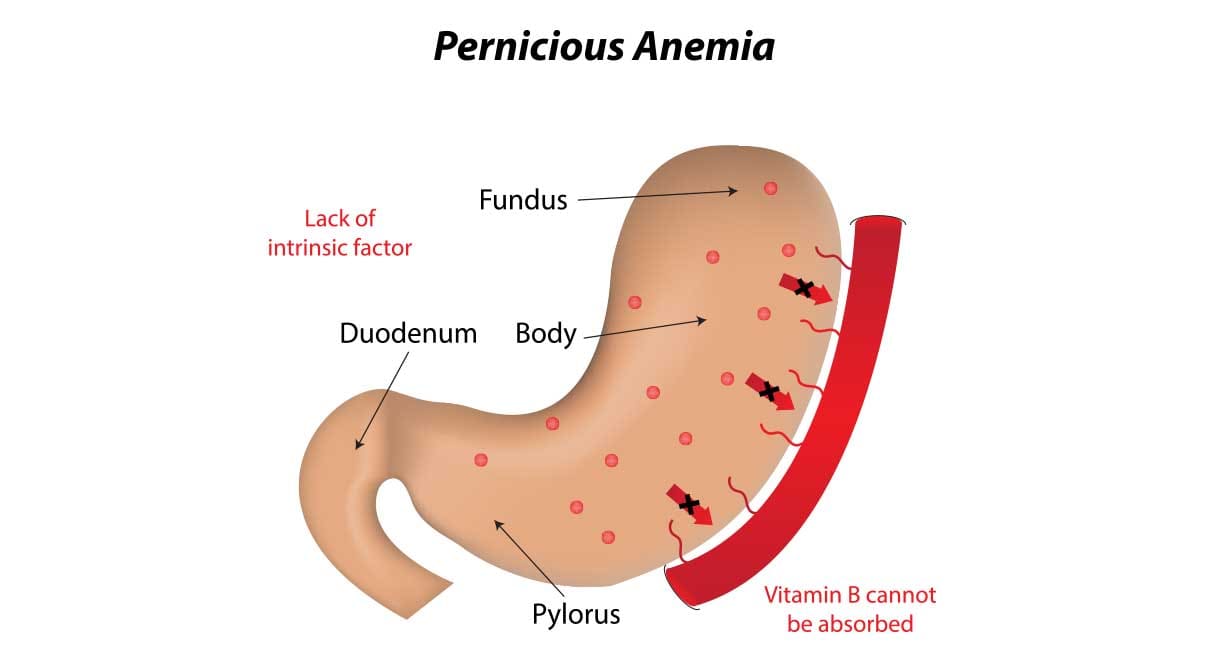Pernicious Anemia
What causes it?
- It can be a disease of the elderly due to decreased absorption due to reduced production of intrinsic factor.
- Most cases of pernicious anemia are due to autoimmune disease (see Autoimmune Conditions). It may be associated with other autoimmune diseases, particularly thyroid disease, Addison’s disease and vitiligo (loss of skin pigmentation). In autoimmune cases the body produces antibodies against the cells producing intrinsic factor. The cells then die and B12 deficiency and pernicious anemia develop.
- Sometimes the condition can be caused by stomach cancers and ulcers, which can take up so much room in the stomach that there are too few cells remaining producing intrinsic factor.
Diagnosis
Parietal cell antibodies are present in virtually all patients with PA. Intrinsic factor antibodies are found in only 50% of patients but are specific for the diagnosis of pernicious anemia.
What are the symptoms?
The symptoms of pernicious anemia are those of vitamin B12 deficiency. This includes symptoms of anemia, such as:
- Tiredness, pallor, faintness, headaches, shortness of breath and palpitations.
- Neurological changes, like numbness, tingling, weakness, clumsiness and difficulty walking (particularly at night when the patient cannot see where they are going and have to rely on an awareness of the position of their legs).
- Deteriorating mental function and dementia can also be caused by vitamin B12 deficiency. These neurological changes may be permanent if the condition is left untreated.
- Other symptoms include weight loss, a low grade fever (of unknown cause) and sometimes a red sore tongue and cracking at the corners of the mouth.
- Males with pernicious anemia have a higher incidence of stomach cancer than the general population.
Treatment
Pernicious anemia is treated by correcting the vitamin B12 deficiency. Hydroxocobalamin (vitamin B12) is given as an intramuscular injection initially weekly, and then every one to three months for the rest of the patient’s life. These injections are very effective and eliminate the symptoms; provided treatment is given early enough. It is not recommended to use oral supplements – the intramuscular injections are the only efficient method of supplementing B12 when treating pernicious anemia.
Diet
- Follow the eating guidelines in the book “Healing Autoimmune Disease”.
Raw juicing
Include plenty of raw vegetable juices. The recommended juice recipes in “Raw Juices Can Save Your Life Book” are:
Blood Building Juice
Ingredients
- 2 sprigs parsley
- 1 small beetroot with some stem and leaves
- 1 carrot
- 2 oranges
- 3 spinach/silverbeet leaves
- 1/2 cup wheatgrass
- 2 dandelion leaves or 2 turnip leaves
- 1/2 cup blackberries or raspberries
- 1 tsp kelp powder
Method
- Wash, trim and chop and pass through juicer. Dilute if desired.
Peptic Ulcer Juice
Ingredients
- 2 large cabbage leaves
- 1 cup alfalfa sprouts
- 2 carrots
- 2 sticks celery
- 2 apples (skin on)
- 10 mint leaves
- 1/2 cucumber
- 1/2 cup aloe vera juice or juice some fresh leaves
Method
- Wash, trim and chop and process through juicer. This juice can then be put into a blender with the aloe vera juice for more thorough mixing.
Recommended supplements for pernicious anemia
- Selenomune
Take 1 capsule daily with food. Selenium is helpful for all autoimmune diseases. - Vitamin D
Take 1 capsule daily with food. Vitamin D insufficiency is very common and can worsen autoimmune problems. - Ultimate Gut Health powder
Take 1 level scoop daily. Ultimate Gut Health keeps your intestines as healthy as possible. Designed to soothe, heal and repair the gut lining, you will find your intestines love this powder.
The above statements have not been evaluated by the FDA and are not intended to diagnose, treat or cure any disease.


Thank for this I’m going to make the juice and think this might put my BP up I read where tomato juice helps but don’t want to get any tummy upset as I have not got that yet TG
X
Hi Anne,
Please let us know how you get on.
Kind regards,
Jessah Shaw
Nutritionist